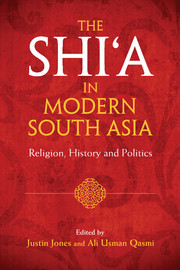Book contents
- Frontmatter
- Contents
- Preface
- Introduction
- 1 Faith Deployed for a New Shiʿi Polity in India
- 2 The Ismaʿili – Isna ʿAshari Divide Among the Khojas
- 3 Local Nodes of a Transnational Network
- 4 Shiʿism, Humanity and Revolution in Twentieth-century India
- 5 Universalising Aspirations
- 6 Muslims, Media and Mobility in the Indian Ocean Region
- 7 Shariʿa, Shiʿas and Chishtiya Revivalism
- 8 Third Wave Shiʿism
- Contributors
- Index
5 - Universalising Aspirations
Published online by Cambridge University Press: 05 May 2015
- Frontmatter
- Contents
- Preface
- Introduction
- 1 Faith Deployed for a New Shiʿi Polity in India
- 2 The Ismaʿili – Isna ʿAshari Divide Among the Khojas
- 3 Local Nodes of a Transnational Network
- 4 Shiʿism, Humanity and Revolution in Twentieth-century India
- 5 Universalising Aspirations
- 6 Muslims, Media and Mobility in the Indian Ocean Region
- 7 Shariʿa, Shiʿas and Chishtiya Revivalism
- 8 Third Wave Shiʿism
- Contributors
- Index
Summary
This article traces the contours of a historical entanglement that characterised the socio-religious life of the worldwide Ismaʿili community in the twentieth century. The setting for this historical process, and the changes that it unleashed, is colonial South Asia and East Africa, where the Indian-origin Khoja Ismaʿilis comprised a diaspora, somewhat akin to the complex composite model put forward by Engseng Ho that informs the present study. The diasporic Khoja Ismaʿili community of the western Indian Ocean rim represents a classic example of the appropriation of the late colonial configurations of capital, cultural and ideational exchange. It is among the diasporic Khoja Ismaʿilis, again, that Ithna ʿAshariya Khoja Ismaʿili secessionism — defying the authority of the Imam and laying the foundations of a Khoja ShiʿA Ithna ʿAshariya community — bore implications probably greater than anywhere else. This, in the process, led the hereditary Imam of the Khoja Ismaʿilis, Sultan Muhammad Shah Aga Khan III (1877–1957; Imam from 1885 to 1957), to resort to taking the first steps in laying down community protocols that over the decades came to define the Khoja Ismaʿili community's relations with the Imamate, while also instilling a new sense of community ethics. An array of coeval historical forces in South Asia and East Africa in late colonial times thus marked the first steps towards the development of an Ismaʿili identity, dovetailing with certain understandings of Ismaʿili ethics of social service and activism under Aga Khan III and thereafter, Shah Karim Aga Khan IV (1936–; Imam since 1957). The transition from Aga Khan III's Imamate to that of Aga Khan IV marked a further expansion of the scope of this project of social service, feeding as it did into grander developmental ventures invoking at once the sophisticated rhetoric of corporate management, academics and policy making, with the Hazir Imam Aga Khan at the apex.
- Type
- Chapter
- Information
- The Shi‘a in Modern South AsiaReligion, History and Politics, pp. 105 - 130Publisher: Cambridge University PressPrint publication year: 2015
- 2
- Cited by



